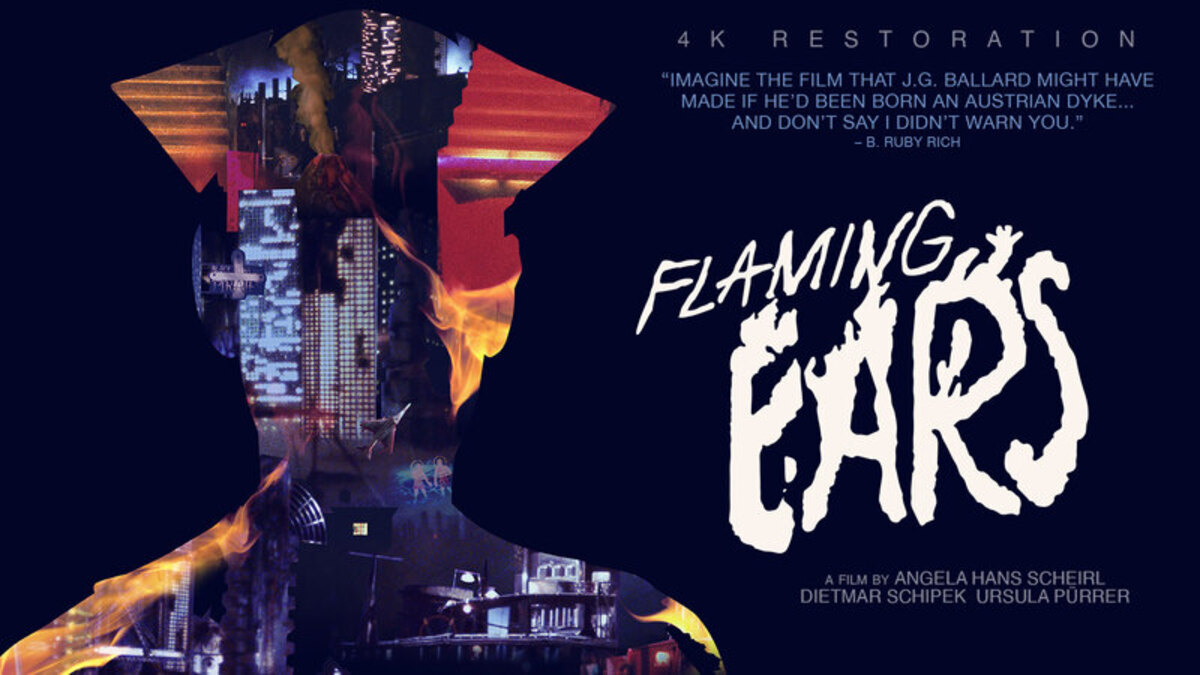
Flaming Ears
directed by Angela Hans Scheirl, Ursula Pürrer, and Dietmar Schipek
starring Susanna Heilmayr, Margarete Neumann, Ursula Pürrer, and Angela Hans Scheirl
Growing out of the economic growth and public acceptance of new technologies that also coincided with a homogenization of sexuality in response to HIV in the 1980s was a tangible threat to the way of life for the nocturnal denizens of forgotten urban pockets — pockets that had once been abandoned by upright citizens who, in years past, had only viewed the city as a center of commerce. Neighborhoods that once basked in subversive underground decadence and thriving artistic movements were steadily overthrown by entrepreneurs and speculators who, at best, looked at these areas as a freakish novelty, and at worst, saw these areas solely as potential points of investment. These economic and moralistic metropolitan invasions were handled comically in mainstream films like Scorsese’s After Hours, but in independent, underground cinema, these impending menaces were confronted in the dour, micro-budget science fiction films of the era.
By 1991, when the Austrian filmmaking trio of Angela Hans Scheirl, Ursula Pürrer, and Dietmar Schipek had created their visionary super 8mm feature, Flaming Ears, there had been a quiet but significant infusion of small, vital sci-fi features worldwide ranging from Slava Tsukerman’s Liquid Sky to Decoder by Muscha that envisioned a dystopian future where growing media influence, skewed carnality, and urban decay chaotically converged to freeze our connections to one another.
Flaming Ears is set over seven hundred years into the future during the Year of the Toads in the fictional industrial wasteland city of Asche, a non-utopian kind of refinery town or shipping port that no one wants to live in, but is still an essential place for the function it serves. In this barren landscape, we open on Spy (Susanna Heilmayr), who is sitting alone and illustrating the heavenly images she sees in the moonlit sky with paper and ink. Shrouded by the night, we then cut to the post-apocalyptically dressed and roller skate equipped Volley (co-director Ursula Pürrer), who descends in front of a stunning panorama of painted futuristic images before landing in a warehouse where she has a roll around between the endless rows of wooden cabinetry. Clearly not satisfied with just a skate, Volley proceeds to lubricate and hump a table before she gleefully sets fire to the room of old furniture that also houses Sky’s printing press and comix.
Alerted to the destruction of her press by Volley’s chauffeur, Magdalena (Margarete Neumann), who mocks Sky for her fantasy of a better world that she’s created in her comix, Sky heads out with revenge on her mind and gun in hand to The Tempest at Our Backs, a sex club where Volley is the star attraction. But, before Sky can dole out some payback, she is viciously beaten to a bloody pulp by the borderguard/bouncers. Now writhing in pain and left for dead, Sky is rescued by the stealthy and alienesque Nun (co-director Angela Hans Scheirl).
Clad in a club kid, red plastic spacesuit and possessing a penchant for devouring the reptiles from the plagues of Exodus, Nun initially fills the screen with a less impish Pris Stratton-replicant vibe, which transforms into a benevolent spirit when she secures the ailing, partially conscious Sky in her flat. In Sky, Nun feels a genuine link, but to nurture this bond, Nun must hide her from the claws of her wildly unpredictable lover, Volley, who visits Nun with flowers in hand only to berate her in the end. Volley is incensed by Nun’s lack of cleanliness, and in the course of her tirade, she is oblivious to Sky’s presence in the apartment. When things finally quiet down, Volley leaves a sleeping Nun to wreak further havoc on Asche, and Sky arises from her hiding place and flees. When Nun awakens, she returns to the streets and develops into a beatific, corrective force that challenges both the nihilistic and hedonistic elements of Asche, and through her actions, Nun becomes the precipitant to carry Volley and Sky away from the perpetual darkness that blankets them all.
Though set in the future, Flaming Ears is a film of broken connections and ubiquitous boundaries that feels eerily reminiscent of the mood of the AIDS epidemic during the early ’90s. Everything that transpires in Asche mirrors the cold distance that was the standard of that time, and if there is a single image from the film that epitomizes the period perfectly, then look no further than to that of the unused, flaccid wooden penis strapped to Volley during her masochistic performances, a symbol of deviation that carried with it no risk of rampant infection and no possibility of intimacy. As the panic around the virus grew in the ’90s and the cities were taken over by urban professionals, cultural endeavors were corrupted to become only commercial ventures, and anything that existed outside of the norm was driven to the fringes, making untamed expression into an act of rebellion.
Directors Scheirl, Pürrer, and Schipek offer Nun as the potential counterforce to these defacing changes. In her healing presence, Nun emerges as a reminder that the battle for the vibrancy of cities cannot be won by simply rejecting what’s normal and pivoting to the opposite, but rather by maintaining and supporting a place where identities across varying extremes can coexist, connect, and thrive. But sadly, when Flaming Ears was made, Nun was already a dying breed, and the decades that followed only led to her extinction, leaving us with the homogenized megalopolises of today.
The new 4k restoration of Flaming Ears opens on Thursday, November 17 at the American Cinematheque in Los Angeles and Friday, November 18 at Metrograph in New York before expanding to select cities.
Featured photo courtesy of Kino Lorber












